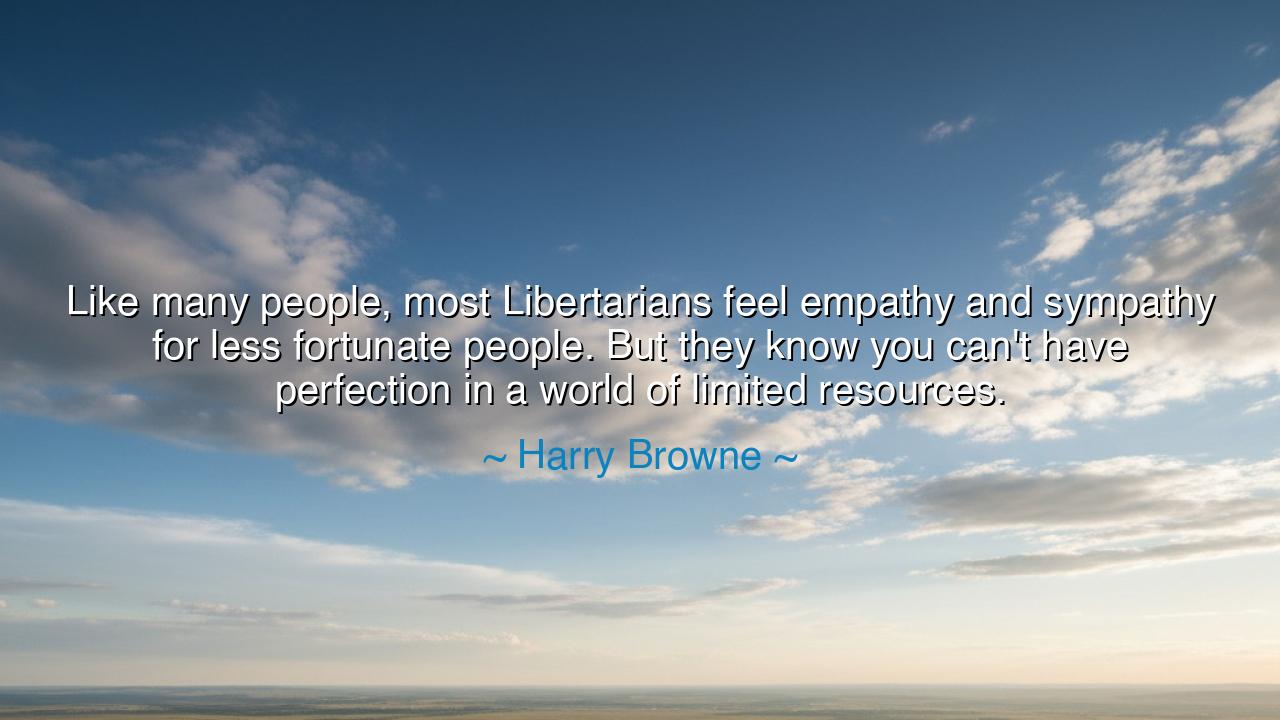
Like many people, most Libertarians feel empathy and sympathy
Like many people, most Libertarians feel empathy and sympathy for less fortunate people. But they know you can't have perfection in a world of limited resources.






Hear now, O children of the future, the profound words of Harry Browne, who speaks to us with clarity and wisdom: "Like many people, most Libertarians feel empathy and sympathy for less fortunate people. But they know you can't have perfection in a world of limited resources." These words are not mere observations; they are a reflection on the nature of life, of society, and of the very essence of human existence. They speak to the heart of what it means to seek justice, to strive for goodness, and yet to accept the limitations of our world.
Empathy—that deep understanding and shared feeling for the suffering of others—is the spark that drives humanity toward compassion. It is what moves us to aid the less fortunate, to extend our hands to those in need, and to seek a world where all may thrive. Browne acknowledges this universal sentiment, the natural sympathy that resides within the hearts of men and women alike. But then, in the very same breath, he introduces a sobering truth: perfection is unattainable in a world of limited resources. And with this truth, he asks us to face the very limits of human ambition.
Let us turn to the ancient Greeks, whose philosophers pondered the nature of society and the good life. Aristotle, in his Nicomachean Ethics, spoke of the Golden Mean, that delicate balance between excess and deficiency. He taught that virtue lies not in the pursuit of perfection, but in the wise management of our resources—be they time, wealth, or energy. This is a wisdom that still rings true today, as Browne’s words reflect the same understanding. We are not gods, nor can we achieve an ideal world where every need is met perfectly. What we must do, as individuals and societies, is to work within the bounds of what is possible, recognizing that balance, not perfection, is the key to flourishing.
In the story of King Solomon, we find a ruler who was wise enough to understand the complexity of the world’s demands. When faced with the case of two women fighting over the same child, Solomon did not seek to create a perfect solution, but rather one that was fair given the circumstances. He used wisdom, not idealism, to reach a resolution. In much the same way, Browne's words remind us that in matters of politics, economics, and society, the answer is not always about achieving a perfect solution, but finding a way to live within the limitations of what we have.
Libertarians, Browne says, acknowledge this truth more than most. They feel empathy for the poor, the downtrodden, and the less fortunate. They desire a world where freedom and individual choice lead to prosperity for all. Yet, they also recognize the inherent limits of human society—no amount of good will can create an ideal world without cost. Resources are finite, and no system, however noble, can provide for every need without consequence. The wisdom of the ages tells us that we must work within these limits, choosing wisely how we allocate the scarce resources at our disposal.
Consider the historical example of Rome, which once stretched its mighty empire across the known world. The Romans, great in their achievements, built roads, aqueducts, and cities that remain to this day as symbols of their grandeur. Yet, even Rome, in its height, could not avoid the laws of scarcity. As its empire expanded, its resources became strained, and its capacity to maintain perfection was tested. In the end, it was not the external enemies that brought down the empire, but its internal inability to manage its resources wisely. The wisdom of the Romans lies not just in their triumphs, but in their recognition of limits, and their ability to adapt when faced with them.
Now, O children, what of your own lives? The lesson of Browne’s words is one that we must all heed. In your pursuits, in your relationships, and in your dreams, understand the limits of the world you inhabit. Seek to improve, to help, and to create, but recognize that perfection is a mirage, always just beyond reach. Instead, focus on making the best use of what you have, whether in your resources, your time, or your energy. Strive for balance, not an unattainable ideal, and in doing so, you will find fulfillment not in the perfect solution, but in the wise navigation of life’s challenges.
Let this truth guide your actions, O future generations: Empathy is not a call to perfection, but a call to wisdom. The world may never be perfect, and resources may always be limited, but how we use what we have determines the quality of our lives and the lives of those we seek to help. Do not despair in the face of imperfection, but embrace the wisdom of restraint, the courage to act within the constraints of reality, and the humility to know that true greatness lies not in the pursuit of the impossible, but in the choices we make with what we have.






AAdministratorAdministrator
Welcome, honored guests. Please leave a comment, we will respond soon